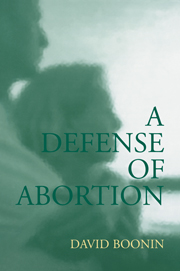2 - The Conception Criterion
Published online by Cambridge University Press: 05 June 2012
Summary
OVERVIEW
The first claim needed to sustain the rights-based argument against abortion maintains that the (typical) human fetus has a right to life. A number of distinct arguments can be made in defense of this claim, but all stem in one way or another from a common idea: that you and I have this right, and that we are related to human fetuses in important ways in which we are not related to dogs, trees, ecosystems, and other possible objects of moral concern. The challenge facing the proponent of this claim, then, is to identify specifically what the salient relationship is between the human fetus and us and to explain which fetuses it shows to have this right and how it shows this. This chapter will consider arguments of this form that attempt to show that the human fetus acquires the right to life at the moment of its conception, a claim that I will refer to as the conception criterion. I will argue that none of the arguments for the conception criterion that have thus far been proposed is satisfactory, and that this can be shown on terms that critics of abortion can and do accept.
Some of the arguments that have been proposed in favor of the conception criterion, particularly some of the arguments treated relatively early in this chapter, are not especially powerful, and I devote relatively little space to responding to them.
Information
- Type
- Chapter
- Information
- A Defense of Abortion , pp. 19 - 90Publisher: Cambridge University PressPrint publication year: 2002
Accessibility standard: Unknown
Why this information is here
This section outlines the accessibility features of this content - including support for screen readers, full keyboard navigation and high-contrast display options. This may not be relevant for you.Accessibility Information
- 1
- Cited by
